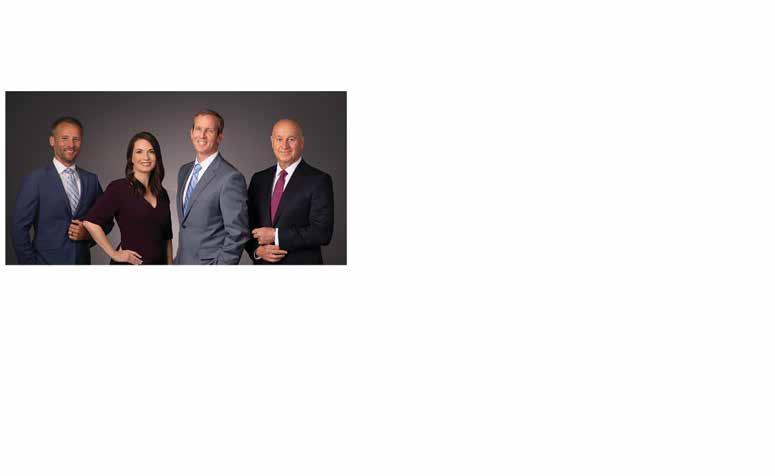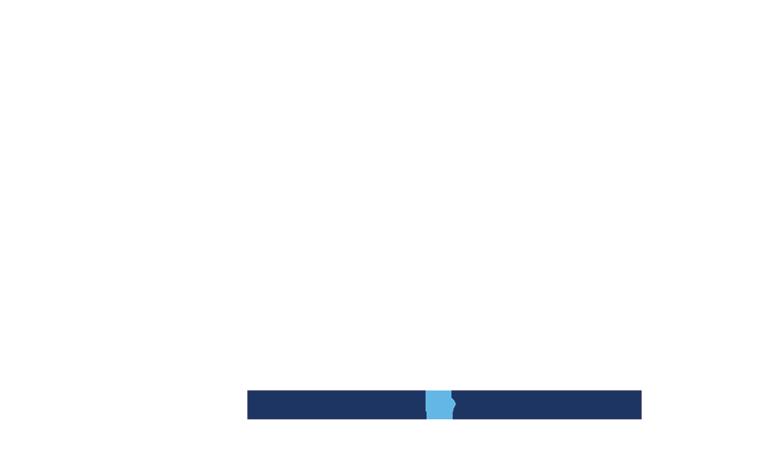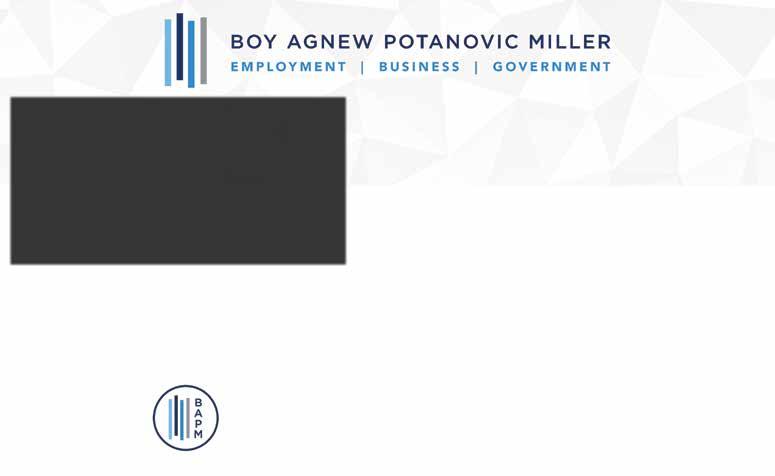
18 minute read
Guest Attorney
Ready to DASH?
by kimberly davis bocelli and john miller co-chairs of the health and wellness committee
The Lee County Bar Association’s Health and Wellness Committee, in conjunction with the Fort Myers River District Alliance, is excited to announce that the third annual Downtown Dash is on Friday, September 16, 2022 at 6:00 p.m. After being moved to Spring 2021 from Fall 2020 due to the pandemic, it’s back in its original season and better than ever. The Dash was originally created in 2019 to provide a local event where health and wellness was brought to the forefront for the legal profession. Legal work is stressful – with demanding hours, clients, and responsibility. Add in the demands from a busy personal life and top it off with the uncertainty of a global pandemic, and stress levels are bound to rise even further. Over the past two years, as a legal community, our mental and physical health have been severely taxed, and many are looking for ways to reclaim their health. John Miller, a co-creator of the Dash, uses running to balance his physical and mental health. He tries to exercise almost every day, whether by running, biking, swimming laps at the pool, or going to the gym. Daily exercise helps keep him balanced, gives him a clear mind to focus on his practice, and makes him feel ready to take on the challenges of the day. John also enjoys running with his wife, Kayla, who is an attorney in private practice. After less than a year in private practice and settling into a sedentary lifestyle, Kimberly Davis Bocelli started running in 2006 to live a healthier lifestyle. A colleague’s invitation to run a local 5K escalated to longer races and joining the Board of the Fort Myers Track Club. In addition to relieving stress, running also provides her an opportunity to catch up with friends, lawyers and non-lawyers alike, while getting exercise. Whether you are an experienced runner looking to test your limits at the one-mile distance or a couch potato trying to kickstart a more active lifestyle, or anywhere in between, the Dash is a great opportunity to fulfill your personal goals and you’ll be happy you crossed the finish line. The Dash welcomes all ages, speeds (walkers welcome!) and competition levels. The Dash will have a different course in 2022: starting and finishing on First Street, near the Sidney and Berne Davis Art Center at 2301 First Street. The first 200 registrants will receive a gender-specific singlet. There will be awards for the top three finishers (male and female) in each of the standard age groups, as well as the top finisher (male and female) in specialty categories for the fastest lawyer, legal staff and court staff (judges, clerks, bailiffs, etc.). The Fort Myers Track Club will chip-time this event. Furthering our impact, the Downtown Dash seeks to promote health and wellness within the community at large. As in 2021, the net proceeds from the Dash will benefit the Fort Myers branch of the SKY Family YMCA, which offers many services that promote health and wellness for individuals, families and our community, including youth sports programs. By supporting the YMCA today, we are helping to improve health and wellness opportunities into the future. The Dash is being held in conjunction with the River District Alliance’s Music Walk, so registrants and spectators are encouraged to stick around afterward to enjoy the entertainment and businesses downtown. This promises to be a fun, family-friendly event for a great cause. Sign up by visiting www.runsignup.com/Race/FL/FortMyers/ DowntownDashFortMyers. We hope to see you all there!
Kimberly Davis Bocelli is a General Magistrate for the Twentieth Judicial Circuit Court in Lee County, Florida. She presides over civil, guardianship, probate, mental health, and family law cases, and previously practiced civil litigation.
John Miller, Esq. is a partner with Boy Agnew Potanovic Miller. He focuses his practice exclusively in civil litigation and has extensive experience representing businesses, government entities, individuals, and insurance carriers at the trial and appellate levels, as well as in arbitration proceedings.
Is lack of sleep ruining your life?
by keith grossman, esq.

Attorneys are used to working long hours and “pulling allnighters”. They become accustomed to it in law school, and for some, it even becomes a badge of honor. Busy attorneys are focused on case management, client service and law office management. Young associates look to impress the law firm partners with their high billable hours. Time disappears, and with it, the opportunities for precious sleep. Attorneys, of course, work much more than the standard 40-hour work week as well as manage a huge amount of stress. For many, this lifestyle significantly impacts their personal and social lives. It also impacts their overall health. Last month, the Res Gestae looked at topics related to mental health. This article looks more closely at sleep patterns, and how lack of sleep robs our bodies of the ability to rest and recover. Studies show 50 – 70 million people in the U.S suffer from insomnia, which is defined as being unable to fall asleep or stay asleep for long. According to the National Sleep Foundation, the average adult requires between 7-9 hours of sleep per night. Getting proper sleep is part of an overall health plan, and healthy sleep habits is known as “sleep hygiene.”
Health Risks Associated with Lack of Sleep
A study conducted by the Mental Health Foundation found that people that didn’t get enough sleep were four times as likely to suffer from lack of concentration, have relationship problems, be 3 times more likely to suffer from depression and be 2.6 times more likely to commit suicide. The University of Warwick conducted a study and found that getting less than 6 hours of sleep on a continuous basis makes you 48% more likely to die of heart disease and 15% more likely in developing a stroke.
Professor Kevin Morgan from Loughborough University’s sleep research team says that “those who sleep 7-9 hours live longer than those who sleep shorter or even longer”. Frank Cappuccio, Professor of Cardiovascular Medicine & Epidemiology and co-author of the University of Warwick study, says, “the trend for late nights and early mornings is like a ticking time bomb for your health”. Sleep is an altered state of consciousness where we have limited interactions with our surroundings and are relatively quiet and still (depending on the stage of sleep). Contrary to our quiet physical state, the brain is very active during sleep, carrying out many important functions. A good night’s sleep is the body’s best way to heal physically, emotionally and mentally. Proper sleep refreshes and rejuvenates us. It helps us take on the day’s challenges. Lack of sleep can make you feel tired, forgetful and irritable. Medical professionals tell us sleep is interdisciplinary because it touches every aspect of health; it’s not only the determiner of whether we are tired or alert. Sleep is essential to every process in the body and is needed so our bodies and minds work correctly. Without proper sleep, the brain can’t regenerate properly. Sleep affects our ability to fight disease and develop immunity. It also impacts our metabolism and chronic disease risk. Quite simply, lack of sleep can be a matter of life and death. As noted, sleep and mental health are tied together. Good sleep is essential for maintaining our baseline mental health. We know one night of sleep deprivation can dramatically affect our mood. Chronic sleep deprivation is associated with depression, anxiety, and other conditions. It can become a never-ending cycle because anxiety and depression often affect sleep, which then impacts our ability to manage the anxiety and depression, and so on.
Ways to Improve Your Sleep Patterns
In order to help them sleep, some people drink a glass of wine or hard liquor before going to bed. Others take a sleeping pill. This behavior can actually make it more difficult to get good sleep, however. Sleeping pills are actually “non-waking” pills that lead to poor-quality sleep and early awakenings. Coffee, alcohol and most sleeping pills also interfere with the REM (rapid eye movement) sleep, which is when your body heals the most. Clearly, staying active during the day helps with proper sleep. Lee Health offers a number of other tips to improve your sleep: Maintain a regular bedtime and waking time, even on weekends or vacation. A nightly practice of dimming your home and electronics (using night mode on phones and computer screens), and lowering your ambient temperature to 68-70 degrees helps. Don’t go to bed unless you are sleepy. Never try to force yourself to go to sleep. The goal is to reduce the time you are lying awake in bed. If you are not sleepy, do something calming and relaxing (like easy reading) not stimulating the mind (like computer games). If you cannot fall asleep within 20 minutes or so, get up! Leave the bedroom until you feel sleepy. Sit quietly and read something relaxing. Do not turn on the bright lights because the light tells your brain that it is time to wake up. Avoid the computer or the cell phone. Try not to be anxious about sleep. Worrying in general will certainly
Without proper sleep, the brain can’t regenerate properly. Sleep interfere with your sleep. Set aside time to think about these issues during the day. If you find yourself thinking too affects our ability to fight disease much, write down your thoughts. and develop immunity. It also Restrict activities in bed to those that impacts our metabolism and promote sleep, such as light reading. Do chronic disease risk. not watch TV in bed. Do not eat in bed. Do not use your bed for anything other
Quite simply, lack of sleep can than sex or sleep. (Author’s note: avoid be a matter of life and death. associating the bed with being awake). This helps train your brain that when you go to bed, it is time for sleep. Keep your bedroom dark and cool. Don’t go to bed hungry or too full. A light snack before bed is acceptable. Avoid taking naps during the day, especially in the late afternoon or evening. Try taking a hot bath 1-3 hours prior to going to bed. This will help to increase deep sleep. A temperature of 106 degrees Fahrenheit is recommended. Exercise regularly, but not within 4 hours of bedtime. Regular exercise will help your sleep and overall health. You may want to do light yoga or stretching close to bedtime. Refrain from smoking, alcohol or caffeine at least 6 hours before bed. Alcohol may seem like a good way to get to sleep, but in fact, it greatly interferes with your sleep. Caffeine stays in your system for a long time. It takes about 6 hours after drinking a caffeinated beverage for it to be eliminated from your body. If you are having trouble sleeping it is best to eliminate all caffeine from your diet. Avoid energy boosters and sleeping pills. This helps restore sleep to the way it is intended to be. Breathing practices such as 4-7-8 breathing (breathe in for
4 seconds, hold for 7 seconds, exhale for 8 seconds) and relaxation techniques such as meditation, yoga, and guided imagery will calm your mind and lay a solid foundation for a restful sleep. On this last point from Lee Health, a 2015 study published in JAMA Internal Medicine reported that among older adults, meditation could produce “robust improvements in sleep.” Assistant Public Defender Ashley Kogan Weed, who is also trained as a yoga instructor, believes strongly in the benefits of meditation and yoga for sleep. She recommends taking five minutes each evening to prepare for sleep. “Finding a nighttime routine is helpful in preparing yourself to go to sleep.” She also says, “You can do a guided meditation using the ‘Calm’ or ‘Insight Timer’ apps. I do a lot of guided relaxation practices.” To become a yoga teacher, Kogan Weed initially received 200 hours of training. She has also been trained in trauma informed yoga. Additionally, she has been trained in the “Warriors at Ease” training program, which provides evidence-based, trauma-informed, and accessible mind-body practices. Kogan Weed says, “the importance of sleep was included in most of my trainings.” In her classes, Kogan Weed teaches the “Legs Up the Wall” posture. This pose is where you keep your back flat, and your legs are against the wall or something like a couch. “It allows your body to relax the parasympathetic nervous system.” This is the part of your nervous system that relaxes your body after periods of stress or danger. “It helps you go into a rest and digest process.” Kogan Weed has been teaching yoga for three years, and she currently teaches trauma-informed yoga at Vibe Yoga. People who are interested in attending her classes can register through Vibe Yoga or at the Mindbody app. Kogan Weed also suggests turning off your phone before you go to bed. She says that ideally, you would do this an hour before bedtime. This is a tip also recommended by Magistrate Kimberly Bocelli, who is also co-Chair of the LCBA Health & Wellness Committee. She says, “One of the concrete things I’ve implemented is using the Downtime feature on my iPhone.” Downtime allows you to limit the time you spend on your iPhone. Bocelli has it scheduled from 10:00 PM through 6:00 AM. She says, “This is so I can’t sit and scroll right before bedtime.” She typically goes to bed at 10:30 PM. She says to set these limits on your iPhone, go to Settings,
then Screen Time, then Downtime and App Limits. Bocelli also strives to not work on her computer or watch TV after 10:00 PM. She prefers to read for 15 minutes before going to bed. She says it helps her wind down. If she does have to use a device with a screen after 10:00 PM, she has a pair of blue light glasses she wears. She’s not certain if the science supports the benefits of blue light glasses, but she believes they help. She says, “I find it’s easier to fall asleep.” Bocelli has also read that direct exposure to morning sunlight in your eyes just after waking up can help you sleep better at night. Mark Hyman, MD, writes that the light from the sun enters your eyes and triggers your brain to release specific chemicals and hormones that are vital to healthy sleep, mood, and aging. Therefore, Bocelli walks her dog for 20 minutes each morning in direct sunlight without sunglasses. Additionally, a friend recommended to Bocelli to use a sunrise alarm clock Assistant Public Defender Ashley with nature sounds, which Bocelli Kogan Weed, who is also trained as has not yet tried. The specific one her a yoga instructor, believes strongly in the benefits of meditation and yoga for sleep. She recommends friend uses is the Philips SmartSleep Wake-up Light. Sunrise Alarm clocks provide 30 to 40 minutes of gradually building taking five minutes each evening artificial light that mimics a sunrise, to prepare for sleep. “Finding and the sound fades in. It starts a nighttime routine is helpful in quietly and slowly gets louder and louder. They are programmable like preparing yourself to go to sleep.” a regular alarm clock. Bocelli says, “I understand it helps make sleep more effective and you feel more rested.” If you are interested in going deeper with meditative practices, Kogan Weed also speaks about Ayurveda, which is an alternative medicine system with roots in India. Kogan Weed says, “Its a sister science to yoga, and it’s been around as long.” In Ayurveda, sleep is one of the three pillars of good health, known as nidra. The right balance of the three pillars is necessary for a healthy life. Ayurveda views sleep as following the Ayurvedic clock, which focuses on the right time to sleep, the duration of sleep, and the ideal time to wake up. In addition to Ayurveda, Kogan Weed suggests learning about Integrative Restoration Yoga Nidra, otherwise known as iRest. It’s a guided 10-step meditation process that promotes psychological, physical, and spiritual healing and well-being. iRest provides tools to help you relax deeply, release stress, and increase resiliency. Kogan Weed says, “It puts your body in a calmed state. It can be very relaxing.” As a final point, a popular book that Kogan Weed suggests reading is “Why We Sleep” by neuroscientist and sleep expert Matthew Walker.

850 Park Shore Drive | Trianon Centre, 3rd Floor | Naples, FL 34103

Your business is our business.
Employment ■ Business ■ Government





















We represent businesses in employment law matters – from hire to termination and everything in between. We provide legal counseling and training to help employers identify legal risks, and collaborate with them to create solutions that work for their workplaces, both private and public sector. Whileourgoalistypicallytohelpclientsavoidclaimsandlawsuits,whenlitigationcannotbe avoided, we are also experienced litigators prepared to defend our clients through trial and appeal.
bapfirm.com ■ 239.208.6500





















4415 Metro Parkway, Suite 110 | Fort Myers, FL 33916
HelpingClerks Help You
by kevin karnes, lee county clerk of the court & comptroller
Providing a healthy workforce makes good business sense. The team members at the Lee County Clerk’s office are responsible for more than 1,000 statutory duties, many of which deal with assisting the public at their greatest and worst of times. We play a vital role during your nuptials, travels requiring passports and the recording of the deed to your new home. We are also there during the most unpleasant times, like divorces, child custody disputes and petitioning for domestic violence injunctions. Our court clerks also record sensitive case evidence, such as murder weapons and autopsy photos. They read through criminal case dockets to accurately redact and protect victim information in many disturbing cases. Each day, we answer hundreds of phone calls and receive hundreds of in-person visits from customers with dire concerns impacting their lives. This critical role in the justice system is challenging and is not for the faint of heart. To ensure the Clerk’s office is a great place to work and that our team consistently provides you excellent customer service, it’s important that our management team works proactively to address and minimize any added stress associated with our sensitive work.
Over the years, we’ve implemented new programs and services designed to improve overall employee wellness. We’ve hosted employee appreciation breakfasts and luncheons, team building exercises, Kaizen sessions, ice cream socials, walking challenges, and numerous socials and fundraisers to benefit United Way. These activities increase employee morale and productivity. They also create an environment conducive to teambuilding and increasing interpersonal relations among all employees. Providing a positive workplace is critical to reducing individual stress and enhancing our public service. Our management team also has an open-door policy, and we encourage our team members to contact their leaders any time for any reason. Addressing concerns quickly and keeping two-way communication is key to ensuring a positive work environment. My office also offers our team members an Employee Assistance Program that provides thousands of free and confidential services, 24/7. They can get mental health consultations, parenting assistance, mortgage counseling, financial management classes, legal assistance, childcare resources, and more. When an employee schedules an appointment with the EAP, they are assessed to determine which services best fit their individual needs. These vital services help manage everyday personal and professional stressors to improve overall health and well-being. As your Clerk, it is my priority to ensure our customers and judicial partners are afforded the highest quality of public service. We couldn’t achieve this without also focusing on maintaining the strength and health of our team of knowledgeable professionals.







